Committee backs extending initial period for senior citizen service district levies, with amendment
Get AI-powered insights, summaries, and transcripts
Subscribe
Summary
House Bill 122 would lengthen the initial authorization period for senior citizen service district mill levies from two to four years and align renewal practice with other special districts; the committee passed an amended version 9–0.
Representative Conley presented House Bill 122 as a change to county processes for senior citizen service districts, explaining the bill would lengthen the period after initial voter approval from two years to four years and otherwise align senior districts with other special districts.
“There's a number of about, I believe, about 12 different senior center service districts in the state right now, and this bill would be very helpful to the seniors of our state,” Representative Conley said, summarizing that the bill preserves services by allowing districts more time to develop programming without repeated elections.
Sponsor and proponents said senior centers deliver meals, transportation, assistance with Medicare enrollment and home‑based services that help seniors remain in their homes. Jessie Dafoe of the Wyoming Senior Services Association told the committee that senior populations have grown and that community‑based services save the state money compared with institutional care: “For every dollar invested in our community based services, like senior centers, it saves the state up to $5 in Medicaid and long term expenses,” Dafoe said.
Local officials and senior center representatives described services that are largely open to all seniors, with some programs using sliding‑scale fees for transportation and other services. Witnesses said districts apply for grants and manage many differing funding streams; one witness said grants can range from about $15,000 to more than $100,000 depending on the program.
An amendment offered during committee proceedings reinstated language to require a reauthorization vote at four years (rather than allowing indefinite continuation without voter action) while preserving the bill's change extending the first reauthorization from two to four years. Representative Johnson proposed a further change to require four‑year reauthorization votes without the bill’s perpetual continuation language; the committee adopted a related amendment after discussion.
AARP Wyoming and several senior center representatives testified in favor of the bill, saying the longer initial authorization period allows programs time to gain traction and is consistent with how other special districts operate. Tom Laycock of AARP noted the practicalities of acquiring capital equipment such as buses, which can take several years from funding to deployment.
Vote and outcome: Committee members recorded a roll call vote on the amended bill with 9 ayes, advancing HB 122 to the full House. The committee recorded the bill as "approved" as amended.
What remains: If enacted, counties and senior service districts would have longer initial periods before a reauthorization election and a process consistent with other special districts; the bill does not change the maximum mill levy amount currently available to senior citizen service districts.
Ending: Proponents said the change would reduce administrative burden on small‑staff districts while opponents and one committee member expressed a desire to preserve voter control over recurring levies; the committee adopted an amendment to preserve periodic voter review and approved the bill to move forward.
